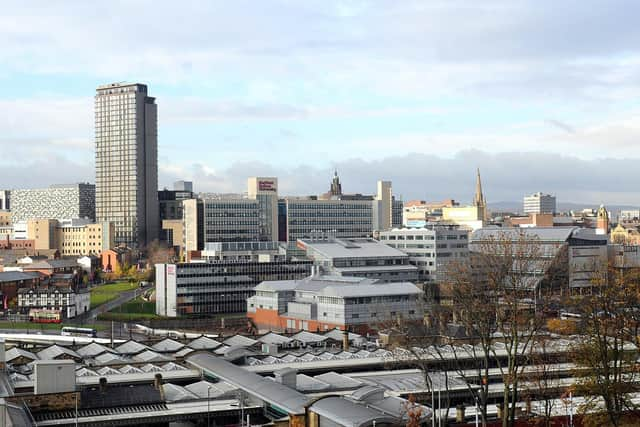Sheffield becomes second Yorkshire city to halt plans for clean air charging zone as pollution levels fall
Sheffield City Council says it is looking at alternative ways of improving air quality without having to charge people after air pollution levels fell by 33 per cent during lockdown.
The Sheffield clean air zone, which would have been introduced in early 2021, would have seen fees of £10 per day for polluting LGVs and Taxis to enter the city centre as well as £50 per day for coaches, buses and HGVs.
Advertisement
Hide AdAdvertisement
Hide AdBut is now one of a number of similar projects which have been put on halt because a sharp fall in traffic on the roads has reduced pollution levels.
In August Leeds City Council claimed work on the proposed clean air charging zone in and around the city centre would be halted while the Government, which is funding the majority of the work, looks into whether the project is needed.
The move prompted fury from drivers who spent thousands of pounds upgrading their vehicles.
Sheffield city leaders said its direction from government to implement a clean air zone was based on plans set out in December 2018, with consultation carried out last summer.


Advertisement
Hide AdAdvertisement
Hide AdBut a spokesman said: "The situation has changed significantly and unexpectedly due to the global Covid-19 pandemic and we have seen drop in air pollution of up to 33% in January to August of this year compared to the same period in 2019."
Bob Johnson, the Labour-run council's Cabinet Member for Transport and Development, said: “We know that air pollution disproportionately harms the poorest, most deprived areas. Action to improve the air we all breathe in Sheffield is essential and everyone has a role to play. During the Coronavirus pandemic we have seen improvements in air quality and we want to sustain them.
“However we are reviewing our plans for the Clean Air Zone in light of Coronavirus. If we can hold onto clean air by introducing other measures without resorting to charging people, we believe this is the best way forward. Alternative measures include incentives for upgrading vehicles, better provision for walking and cycling, and cleaner public transport.
“Many of the businesses who will need to upgrade their vehicles in order to be compliant with the CAZ are focusing quite rightly on controlling the spread of the virus, and working to keep people safe, local people in jobs and businesses afloat. If they cannot afford to upgrade to cleaner vehicles, they may end up paying to pollute and we will all still breathe dirty air.
Advertisement
Hide AdAdvertisement
Hide Ad“With the right clean air plan and crucially, with the right funding from the Government, we can reduce pollution in a fair way, and in a way that is aligned with our zero-carbon goals."
Tom Sutton, Head of Policy & Representation at Sheffield Chamber of Commerce, said: “Given the changed circumstances as a result of Covid-19 it is right to look again at the best way to improve air quality across Sheffield. We welcome the review into the alternative ways we could meet the required air pollution reductions.
"We look forward to working with the Council to think through the impacts that Covid-19 has had on business, transport and travel patterns, and how we can address air quality without placing an undue burden on local businesses, many of who, are facing unprecedented challenges”
Comment Guidelines
National World encourages reader discussion on our stories. User feedback, insights and back-and-forth exchanges add a rich layer of context to reporting. Please review our Community Guidelines before commenting.